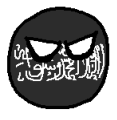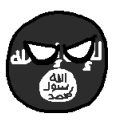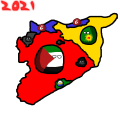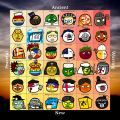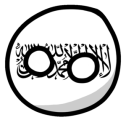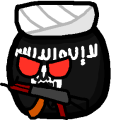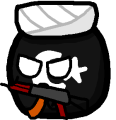"Every Muslim, from the moment they realize the distinction in their hearts, hates Americans, hates Jews and hates Christians. For as long as I can remember, I have felt tormented and at war, and have felt hatred and animosity for Americans."
Jihadism is a radical extremist variant of ![]() Islamic Theocracy. It seeks to establish sharia law and Islamic rule through often violent means. Adherents to this movement generally follow these principles: rejection of all innovation within Islam, strict emphasis on Tawhid, rejection of non-Islamic values, and so on.
Islamic Theocracy. It seeks to establish sharia law and Islamic rule through often violent means. Adherents to this movement generally follow these principles: rejection of all innovation within Islam, strict emphasis on Tawhid, rejection of non-Islamic values, and so on.
Jihadists are noted to share many similarities and have roots within the ancient Islamic sect by the name of "Kharijites" who likewise embraced similar beliefs in regards to takfir and Jihad. However, current day Jihadists reject this representation. His ISIS side hates being called "Da'esh", it sends him into a murderous rage (just like real-life ISIS).
History
 Al-Qaeda
Al-Qaeda
Al-Qaeda's goal is to overthrow the corrupt “apostate” regimes in the Middle East and replace them with “true” Islamic governments. Al-Qaeda’s primary enemy is the United States, which it sees as the leader of a "Judeo-Christian Alliance" intended to destroy the religion of Islam.
 Taliban
Taliban
The Taliban's goals were primarily interested in expelling Western forces from Afghanistan and establishing a government in line with their view of sharia. (Achieved)
The Taliban's ideology has been described as an "innovative form of ![]() sharia combining Pashtun tribal codes", or Pashtunwali, with Deobandi extremist views on Islam. Their ideology is different from the more moderate
sharia combining Pashtun tribal codes", or Pashtunwali, with Deobandi extremist views on Islam. Their ideology is different from the more moderate ![]() Islamism of the Afghan Mujahideen of the Cold War, and
Islamism of the Afghan Mujahideen of the Cold War, and ![]() Qutbism. The Taliban say that they only want to restore peace to Afghanistan and enforce
Qutbism. The Taliban say that they only want to restore peace to Afghanistan and enforce ![]() sharia.
sharia.
According to ![]() Ahmed Rashid, the Taliban, at least in the first few years of their rule, had adopted
Ahmed Rashid, the Taliban, at least in the first few years of their rule, had adopted ![]() anti-Nationalist and
anti-Nationalist and ![]() anti-Feudalist views.
anti-Feudalist views.
The Taliban's regime interprets ![]() sharia in accordance with the Hanafi school of Islamic jurisprudence and the religious teachings of Mullah Omar. The Taliban banned pork, alcohol, music, television, filming, the internet, painting, photography, football, chess, kite-flying and keeping pets. Pet pigeons were killed, cinemas turned into mosques, celebration of the western and Iranian new year was banned. Taking photographs, displaying pictures or portraits was viewed as idolatry, whence, it was banned. Women were banned from working, attending schools or universities, had to observe purdah and to only leave their homes in the company of a male relative. Men were banned from shaving their beards and had to always wear a turban outside. Praying was mandatory and all who did not respect the religious obligation after the azaan were arrested. Gambling was banned and thieves had their hands or feet amputated. In 2000, Mullah Omar banned the production of opium and drug trafficking. The Taliban eliminated 99% of the opium population of Afghanistan by 2001. Both drug users and dealers were severely prosecuted under the Taliban.
sharia in accordance with the Hanafi school of Islamic jurisprudence and the religious teachings of Mullah Omar. The Taliban banned pork, alcohol, music, television, filming, the internet, painting, photography, football, chess, kite-flying and keeping pets. Pet pigeons were killed, cinemas turned into mosques, celebration of the western and Iranian new year was banned. Taking photographs, displaying pictures or portraits was viewed as idolatry, whence, it was banned. Women were banned from working, attending schools or universities, had to observe purdah and to only leave their homes in the company of a male relative. Men were banned from shaving their beards and had to always wear a turban outside. Praying was mandatory and all who did not respect the religious obligation after the azaan were arrested. Gambling was banned and thieves had their hands or feet amputated. In 2000, Mullah Omar banned the production of opium and drug trafficking. The Taliban eliminated 99% of the opium population of Afghanistan by 2001. Both drug users and dealers were severely prosecuted under the Taliban.
Shias were persecuted during the Taliban regime. The majority of Shias in Afghanistan were Hazara, who made up 10% of the Afghan population. But quite a few ![]() Shia Islamists supported the Taliban, like
Shia Islamists supported the Taliban, like ![]() Ustad Muhammad Akbari. Recently, the Taliban have stopped being
Ustad Muhammad Akbari. Recently, the Taliban have stopped being ![]() Anti-Shia and have tried to gain support from the Hazaras and convincing them to join the Taliban, so they can defeat
Anti-Shia and have tried to gain support from the Hazaras and convincing them to join the Taliban, so they can defeat ![]() ISIL-KP.
ISIL-KP.
It wasn't just Shia Muslims who were persecuted under the Taliban, the small community of Afghan Christians were also persecuted by the Taliban. In May 2001, the Taliban announced that the Afghan Hindus would have to wear badges, something that has been compared to the ![]() Nazi use of identification badges on Jews. The Afghan Sikhs were treated better than the Shias, Christians and Hindus by the Taliban. The last Jews in Afghanistan during the first Taliban regime, Zablon Simintov and Isaac Levy, were imprisoned for being "annoying" but were then released from prison because they were "annoying".
Nazi use of identification badges on Jews. The Afghan Sikhs were treated better than the Shias, Christians and Hindus by the Taliban. The last Jews in Afghanistan during the first Taliban regime, Zablon Simintov and Isaac Levy, were imprisoned for being "annoying" but were then released from prison because they were "annoying".
Unlike other ![]() Islamic Fundamentalist groups, the Taliban are not
Islamic Fundamentalist groups, the Taliban are not ![]() Salafist. Although many
Salafist. Although many ![]() Salafists from the wealthy Islamic nations volunteered in the Soviet-Afghan War, the Taliban's leaders suppressed
Salafists from the wealthy Islamic nations volunteered in the Soviet-Afghan War, the Taliban's leaders suppressed ![]() Salafism after their first takeover of Afghanistan. After the
Salafism after their first takeover of Afghanistan. After the ![]() US invasion of Afghanstan, the Taliban allied themselves with the
US invasion of Afghanstan, the Taliban allied themselves with the ![]() Salafists.
Salafists.
The Taliban never debating their doctrine, even with other ![]() Islamic Fundamentalists; "The Taliban did not allow even Muslim reporters to question [their] edicts or to discuss interpretations of the Qur'an."
Islamic Fundamentalists; "The Taliban did not allow even Muslim reporters to question [their] edicts or to discuss interpretations of the Qur'an."
The Taliban, especially their founder Mullah Omar, believe that dreams are a means of revelation.
The Taliban use the pre-Islamic Pashtun tribal code, ![]() Pashtunwali. One example of this is that the Taliban use the Pashtun way of dividing a father's estate equally between his sons, contrary to the Quran's way of dividing a father's estate equally between his children, including daughters.
Pashtunwali. One example of this is that the Taliban use the Pashtun way of dividing a father's estate equally between his sons, contrary to the Quran's way of dividing a father's estate equally between his children, including daughters.
According to Ali A. Jalali and ![]() Lester Grau, the Taliban "received extensive support from Pashtuns across the country who thought that the movement might restore their national dominance. Even Pashtun intellectuals in the West, who differed with the Taliban on many issues, expressed support for the movement on purely ethnic grounds."
Lester Grau, the Taliban "received extensive support from Pashtuns across the country who thought that the movement might restore their national dominance. Even Pashtun intellectuals in the West, who differed with the Taliban on many issues, expressed support for the movement on purely ethnic grounds."
- Views on the Bamiyan Buddhas
In 1999, Mullah Omar ordered a decree protecting the Bamiyan Buddhas, two 6th century statues of standing Buddhas that were carved into the face of a cliff in the Bamiyan valley in the Hazarajat region of central Afghanistan. But in March 2001, Mullah Omar ordered the Bamiyan Buddhas to be destroyed, after issuing a decree saying: "all the statues around Afghanistan must be destroyed."
Yahya Massoud, brother of ![]() Ahmad Shah Massoud, said this about an incident that occurred after the destruction of the Bamiyan Buddhas: "It was the spring of 2001. I was in Afghanistan's Panjshir Valley, together with my brother Ahmad Shah Massoud, the leader of the Afghan resistance against the Taliban, and Bismillah Khan, who currently serves as Afghanistan's interior minister. One of our commanders, Commandant Momin, wanted us to see 30 Taliban fighters who had been taken hostage after a gun battle. My brother agreed to meet them. I remember that his first question concerned the centuries-old Buddha statues that were dynamited by the Taliban in March of that year, shortly before our encounter. Two Taliban combatants from Kandahar confidently responded that worshiping anything outside of Islam was unacceptable and that therefore these statues had to be destroyed. My brother looked at them and said, this time in Pashto, 'There are still many sun- worshippers in this country. Will you also try to get rid of the sun and drop darkness over the Earth?'"
Ahmad Shah Massoud, said this about an incident that occurred after the destruction of the Bamiyan Buddhas: "It was the spring of 2001. I was in Afghanistan's Panjshir Valley, together with my brother Ahmad Shah Massoud, the leader of the Afghan resistance against the Taliban, and Bismillah Khan, who currently serves as Afghanistan's interior minister. One of our commanders, Commandant Momin, wanted us to see 30 Taliban fighters who had been taken hostage after a gun battle. My brother agreed to meet them. I remember that his first question concerned the centuries-old Buddha statues that were dynamited by the Taliban in March of that year, shortly before our encounter. Two Taliban combatants from Kandahar confidently responded that worshiping anything outside of Islam was unacceptable and that therefore these statues had to be destroyed. My brother looked at them and said, this time in Pashto, 'There are still many sun- worshippers in this country. Will you also try to get rid of the sun and drop darkness over the Earth?'"
- Views on bacha bazi
The Afghan custom of bacha bazi, a form of pederastic sexual slavery, pedophilia and child sexual abuse between older men and younger "dancing boys" traditionally practiced in various provinces of Afghanistan, carried the death penalty under the Taliban's rule.
The practice was still illegal during the ![]() Islamic Republic, but the law were rarely enforced against powerful offenders and the police were allegedly complicit in the practice. Allegations have emerged that the US forces had purposefully turned a blind eye to the practice. The US responded by saying the abuse was the responsibility of the "local Afghan government". The Taliban have criticized the US for turning a blind eye to bacha bazi.
Islamic Republic, but the law were rarely enforced against powerful offenders and the police were allegedly complicit in the practice. Allegations have emerged that the US forces had purposefully turned a blind eye to the practice. The US responded by saying the abuse was the responsibility of the "local Afghan government". The Taliban have criticized the US for turning a blind eye to bacha bazi.
- Consistency of the ideology
The Taliban's ideology was not static. Before the fall of Kabul, the Taliban talked about stepping down from power if a government of "good Muslims" came to power and restored law and order to Afghanistan. The decision making process of the Taliban in Kandahar was modelled off of the traditional Pashtun tribal councils (jirga), which the Taliban believed to be an early Islamic model as well. Discussion was followed by a building of a consensus by the believers.
As the Taliban's power grew, Mullah Omar started disregarding the jirga. He only visited Kabul twice during his 6 year long rule. Taliban spokesmen Mullah Wakil explained: "Decisions are based on the advice of the Amir-ul Momineen. For us consultation is not necessary. We believe that this is in line with the Sharia. We abide by the Amir's view even if he alone takes this view. There will not be a head of state. Instead there will be an Amir al-Mu'minin. Mullah Omar will be the highest authority and the government will not be able to implement any decision to which he does not agree. General elections are incompatible with Sharia and therefore we reject them."
Another evolution of the Taliban ideology was in 1999, Mullah Omar ordered the Bamiyan Buddhas to be protected, but, in 2001, he ordered them to be destroyed.
 ISIL/ISIS
ISIL/ISIS
ISIS follows a strategy of focusing on the "near enemy," which means that its primary targets have been governments and groups in the Middle East, rather than the "far enemy," which includes Western countries like the United States. As a result, ISIS has primarily targeted "apostate" regimes in the Arab world![]() , such as the Assad regime in Syria
, such as the Assad regime in Syria ![]() and the Abadi government in Iraq.
and the Abadi government in Iraq.
ISIS has carried out a number of attacks and military operations in the Middle East, including suicide bombings, kidnappings, and beheadings. It has also used social media and other means to spread its ideology and recruit members from around the world. In 2014, ISIS declared itself to be a caliphate and its leader, Abu Bakr al-Baghdadi![]() , as the caliph. This declaration was not recognized by the wider islamic community, and ISIS has faced widespread opposition from a coalition of countries led by the United States
, as the caliph. This declaration was not recognized by the wider islamic community, and ISIS has faced widespread opposition from a coalition of countries led by the United States![]() . In recent years, ISIS has lost much of the territory it once controlled, but it is still considered a significant threat in the region and beyond.
. In recent years, ISIS has lost much of the territory it once controlled, but it is still considered a significant threat in the region and beyond.
 Boko Haram
Boko Haram 
Boko Haram was established by Jihadists in northeast ![]() Nigeria in 2002, catering mostly to uneducated and poor people in the region who revered alleged dominance by the Christian southern Nigerians. Boko Haram was unofficially part of
Nigeria in 2002, catering mostly to uneducated and poor people in the region who revered alleged dominance by the Christian southern Nigerians. Boko Haram was unofficially part of ![]() al-Qaeda from 2007 to 2015, but changed allegiance to
al-Qaeda from 2007 to 2015, but changed allegiance to ![]() ISIS. Boko Haram is far more extreme than
ISIS. Boko Haram is far more extreme than ![]() ISIS, following the ideology of Takfirism which holds that even a Muslim which perfectly follows Islamic law but participates in practices of western civilization is an apostate and can be justly killed. Takfirism has enabled Boko Haram to commit mass atrocities.
ISIS, following the ideology of Takfirism which holds that even a Muslim which perfectly follows Islamic law but participates in practices of western civilization is an apostate and can be justly killed. Takfirism has enabled Boko Haram to commit mass atrocities.
 Turkestan Islamic Party
Turkestan Islamic Party
The Turkistan Islamic Party (TIP) formerly known as the East Turkestan Islamic Movement (ETIM) and other names is an Uyghur Islamic extremist organization, inspired by the Afghan mujahideen founded in Western China with the stated goals of establishing an independent state called East Turkestan replacing Xinjiang Autonomous Region.
In 1989, Zeydin Yusup created the East Turkistan Islamic Party (ETIP) which developed a network of mosques in Xinjiang to encourage anti-communist sentiment among the Uyghur population to secede from ![]() China. ETIP/ETIM became prominent following the Baren Township riot an armed conflict that took place between ethnic Uyghur militants and Chinese government forces in April 1990 which led to Yusup's death. Between 1990-2001, the Chinese government attributed to ETIP over 200 acts of terrorism, which claimed 162 lives and over 440 injured.
China. ETIP/ETIM became prominent following the Baren Township riot an armed conflict that took place between ethnic Uyghur militants and Chinese government forces in April 1990 which led to Yusup's death. Between 1990-2001, the Chinese government attributed to ETIP over 200 acts of terrorism, which claimed 162 lives and over 440 injured.
Ethnic tensions in Western China have been fueled by the fact that the CPC has since the 1980s actively encouraged Han immigrations to Xinjiang to get control over the resource-rich region leading to many native Ughurs feeling thrown under the bus. The best and most well-paid jobs (especially in the private sector) have been offered to Mandarin-speaking citizens of han-ethnicity while Uyghurs have been exploited and forced to less pay by corrupt officials. These factors have been essential in explaining the rise of Islamic extremism and pro-separatist sentiment in the region.
Since the September 11 attacks, EIP has been designated as a terrorist organization by China, ![]() the European Union,
the European Union, ![]() Kyrgyzstan,
Kyrgyzstan, ![]() Kazakhstan,
Kazakhstan, ![]() Malaysia,
Malaysia, ![]() Pakistan,
Pakistan, ![]() Russia,
Russia, ![]() Turkey,
Turkey, ![]() United Arab Emirates,
United Arab Emirates, ![]() the United Kingdom, and the
the United Kingdom, and the ![]() United Nations. The organization was also formerly classified as a terrorist organization by the United States in 2002 to get support from China during the War on Terror.
United Nations. The organization was also formerly classified as a terrorist organization by the United States in 2002 to get support from China during the War on Terror.
The group in its present incarnation was organized in Pakistan and Taliban-controlled Afghanistan by Hasan Mahsum and Abudukadir Yapuquan in the late 1990s. ETIM was severely weakened after the United States invaded Afghanistan and bombed Al Qaeda bases in the mountainous regions along the border with Pakistan leading to their leader, Hasan Mahsum being killed by a Pakistani raid on a suspected Al-Qaeda camp in South Waziristan in 2003. However, ETIM resurged after the Iraq War inflamed mujaheddin sentiment, now referring to themselves as the Turkistan Islamic Party (TIP).
The United States captured 22 Uyghur militants from combat zones in Afghanistan in 2006 on information that they were linked to Al-Qaeda.
In following years the Turkestan Islamic Party came to responsible for a number of terrorist attacks and events of social unrest including but not limited to the 2009 Urumqi Riots, the September 2009 Xinjiang unrest, the 2010 Aksu bombing, the July 2011 Hotan attack, the Pishan hostage crisis among many others, resulting in hundreds more dead and injured.
Since Xi Jinping became the new Paramount Leader of China in 2012, the Chinese Government began to embark on a "Strike Hard Campaign against Violent Terrorism" to crush separatism and Islamic extremism. In early 2014, Chinese authorities in Xinjiang launched the renewed "strike hard" campaign around New Year. It included measures targeting mobile phones, computers, and religious materials belonging to Uyghurs, The government simultaneously announced a "people's war on terror" and the local government introduced new restrictions that included the banning of long beards and the wearing of veils in public places.
Western governments, media, human rights organizations, and the World Uyghur Congress have alleged that over a million Uyghurs have been sent to re-education camps as part of a deliberate attempt at cultural genocide to eradicate Uyghur culture. The Chinese government denies these allegations arguing the camps are vocational training schools intended for re-habilitation and only target those with sympathies for extremist groups such as Turkestan Islamic Party.
The US government under the Trump Administration removed the Turkestan Islamic Party from its list of Terrorist Organizations in 2020, claiming that there’s no credible evidence that it still exists. China accused the US of double standards as it dropped ETIM from its terrorism list, while the U.S. contends that the label has been broadly misused to oppress Muslims including ethnic Uyghurs in Xinjiang.
 Lashkar-e-Taiba
Lashkar-e-Taiba

![]() Lashkar-e-Taiba (LeT) was founded in the 1980s in the midst of the Soviet-Afghan War. The group was formed by a group of mujahideen, including Hafiz Saeed and Abdullah Azzam, with funding from Osama bin Laden
Lashkar-e-Taiba (LeT) was founded in the 1980s in the midst of the Soviet-Afghan War. The group was formed by a group of mujahideen, including Hafiz Saeed and Abdullah Azzam, with funding from Osama bin Laden![]() . Its stated goal was to fight against the Soviet Union and its allies in Afghanistan and to support the establishment of an Islamic state in Afghanistan.
. Its stated goal was to fight against the Soviet Union and its allies in Afghanistan and to support the establishment of an Islamic state in Afghanistan. ![]()
After the Soviet withdrawal from Afghanistan in 1989, LeT shifted its focus to Kashmir, a region disputed between India and Pakistan. LeT's stated goal became the merger of the whole of Kashmir with Pakistan. The organization has been accused of carrying out numerous attacks against military and civilian targets in India, including the 2001 Indian Parliament attack and the 2008 Mumbai attacks. It has been designated as a terrorist organization by many countries, including the United States, the United Kingdom, the European Union, and India. Despite being banned in Pakistan, it is believed by some that Pakistan's intelligence agency continues to provide support and protection to LeT. Some have also accused Pakistan of sheltering the group's leader, Hafiz Saeed
Ghazwa-e-Hind is a concept that is based on a hadith, which is a saying or action attributed to the Prophet Muhammad. The specific hadith that is often cited in relation to Ghazwa-e-Hind is: "The Prophet said, 'You will fight against the Hindus and will emerge victorious. Then you will be called the best of nations raised up for mankind.' He then said, 'Ikramah, do you know what is meant by the best of nations raised up for mankind?' He replied, 'Allāh and His messenger know best.' The Prophet said, 'A nation which will invite people to Allāh and will not resist when they are oppressed, and will fight in the way of Allāh until they become dominant over all religions'" (Sahih Bukhari, vol. 4, book 52, no. 196).
This hadith is often interpreted by those who believe in Ghazwa-e-Hind as a prophecy that Muslims will eventually conquer and convert India to Islam.
Lashkar-e-Taiba and other groups use this to justify their actions.
 Sipah-e-Sahaba
Sipah-e-Sahaba
Sipah-e-Sahaba (literally "Soldiers of the Sahaba") (also known as Ahle Sunnat Wal Jamaat) is a Sunni extremist organization that was founded in Pakistan ![]() in 1985 by Haq Nawaz Jhangvi, Zia ur Rehman Farooqi, Isar-ul-Haq Qasmi, and Azam Tariq. Originally known as Anjuman Sipah-e-Sahaba, the group was founded in the city of Jhang with the stated purpose of fighting against the perceived dominance of Shia landlords
in 1985 by Haq Nawaz Jhangvi, Zia ur Rehman Farooqi, Isar-ul-Haq Qasmi, and Azam Tariq. Originally known as Anjuman Sipah-e-Sahaba, the group was founded in the city of Jhang with the stated purpose of fighting against the perceived dominance of Shia landlords![]() in the area, which had a majority Sunni population. They responded to this with violence and began attacking Shia Muslims. From the 1980s onwards, the group has been involved in various terrorist activities and has been responsible for the murder of thousands of Shia Muslims in Pakistan. The group operates all over the country and is politically active, with a large vote bank in the provinces of Punjab and Khyber Patunkhwa. It is widely organized, with more than 500 offices throughout the country.
in the area, which had a majority Sunni population. They responded to this with violence and began attacking Shia Muslims. From the 1980s onwards, the group has been involved in various terrorist activities and has been responsible for the murder of thousands of Shia Muslims in Pakistan. The group operates all over the country and is politically active, with a large vote bank in the provinces of Punjab and Khyber Patunkhwa. It is widely organized, with more than 500 offices throughout the country.
In 1996, some members of the group left to form another organization called w:Lashkar-e-Jhangvi ![]() . In 2002, the Pakistani government under Pervez Musharraf
. In 2002, the Pakistani government under Pervez Musharraf ![]() declared Sipah-e-Sahaba
declared Sipah-e-Sahaba ![]() a terrorist organization and banned it. However, the group later renamed itself as Millat-e-Islamia ("Nation of Islam"
a terrorist organization and banned it. However, the group later renamed itself as Millat-e-Islamia ("Nation of Islam" No not that one ![]() ))and was banned again in 2003. After the death of Azam Tariq in 2003, Muhammad Ahmed Ludhianvi was selected as the new leader of the organization. A leader of Sipah-e-Sahaba was a minister in the coalition government in Punjab in 1993, and the group has held seats in the Pakistan National Assembly. In 1990, Haq Nawaz Jhangvi was assassinated by suspected Shia militants, and leadership of the group passed to Zia ur Rehman Farooqi. Farooqi died in a bomb explosion in 1997 at the Lahore Session Court. After Farooqi's death, Azam Tariq led the group until his own death in 2003, which was widely attributed to the Shia organization Sipah-e-Muhammad. After Tariq's death, Muhammad Ahmed Ludhianvi was selected as the new leader of the group, with Aurangzaib Farooqi as the president. In 2009, the leader of the group at the time, Ali Sher Haideri, was killed in an ambush
))and was banned again in 2003. After the death of Azam Tariq in 2003, Muhammad Ahmed Ludhianvi was selected as the new leader of the organization. A leader of Sipah-e-Sahaba was a minister in the coalition government in Punjab in 1993, and the group has held seats in the Pakistan National Assembly. In 1990, Haq Nawaz Jhangvi was assassinated by suspected Shia militants, and leadership of the group passed to Zia ur Rehman Farooqi. Farooqi died in a bomb explosion in 1997 at the Lahore Session Court. After Farooqi's death, Azam Tariq led the group until his own death in 2003, which was widely attributed to the Shia organization Sipah-e-Muhammad. After Tariq's death, Muhammad Ahmed Ludhianvi was selected as the new leader of the group, with Aurangzaib Farooqi as the president. In 2009, the leader of the group at the time, Ali Sher Haideri, was killed in an ambush
Since the death of Ali Sher Haideri, Sipah-e-Sahaba has continued to operate in Pakistan, although it has been banned by the government and designated as a terrorist organization by several countries. The group has been linked to numerous acts of violence in Pakistan ![]() , particularly against Shia Muslims. In 2012, the group was involved in a series of attacks on Shia Muslims in Pakistan that left over 200 people dead. In recent years, the group has also been linked to the Islamic State of Iraq and Syria (ISIS)
, particularly against Shia Muslims. In 2012, the group was involved in a series of attacks on Shia Muslims in Pakistan that left over 200 people dead. In recent years, the group has also been linked to the Islamic State of Iraq and Syria (ISIS) ![]() , and there have been reports of its members joining the ISIS ranks in Syria
, and there have been reports of its members joining the ISIS ranks in Syria ![]() and Iraq
and Iraq ![]() . Despite the ban and the government's efforts to crack down on the group, Sipah-e-Sahaba has remained active and continues to have a significant following in Pakistan
. Despite the ban and the government's efforts to crack down on the group, Sipah-e-Sahaba has remained active and continues to have a significant following in Pakistan ![]() .
.
 Hamas
Hamas 
Hamas is an Islamic fundamentalist military movement dedicated to the liberation of ![]() Palestine. They are designated as a terrorist group by some countries such as Israel and the United States. Some other countries only recognize its military forces as a terrorist group.
Palestine. They are designated as a terrorist group by some countries such as Israel and the United States. Some other countries only recognize its military forces as a terrorist group.
Personality and Behaviour
Jihadism is usually portrayed as a fundamentalist Muslim. He enforces ideas of women wearing hijabs, ![]() anti-LGBT,
anti-LGBT, ![]() anti-Americanism, and other Islamic characteristics. He's hard to be friends with as he's quick to call people "infidels" or "kuffar", meaning non-believer. He also has a passion of blowing things up and killing people.
anti-Americanism, and other Islamic characteristics. He's hard to be friends with as he's quick to call people "infidels" or "kuffar", meaning non-believer. He also has a passion of blowing things up and killing people.
How to Draw
[!] The following symbols may be subject to legal restrictions and forbidden use in certain jurisdictions, possibly leading to criminal consequences - be aware. Polcompball Miraheze does not endorse the organizations associated with provided flag designs in any way.
Al-Qaeda design
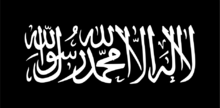
- Draw a ball
- Fill it in with black
- Draw the Shahada (See right) on it, in white
- Add the eyes and you're done!
| Color Name | HEX | RGB | |
|---|---|---|---|
| Black | #202020 | 32, 32, 32 | |
| White | #FFFFFF | 255, 255, 255 | |
ISIS design

- Repeat steps 1-2 from Al-Qaeda design,
- Draw the ISIS flag design (See right) on it, in white
- Add the eyes and you're done!
| Color Name | HEX | RGB | |
|---|---|---|---|
| Black | #202020 | 32, 32, 32 | |
| White | #FFFFFF | 255, 255, 255 | |
Relationships
Halal (Friends)
 Islamic Theocracy - Fellow Muslim, although some of their views are pretty soft, and I'm pretty sure most of them are closet apostates.
Islamic Theocracy - Fellow Muslim, although some of their views are pretty soft, and I'm pretty sure most of them are closet apostates. Islamic Fascism - Based, but I hate when we get confused for each other. I did support him in Turkey though.
Islamic Fascism - Based, but I hate when we get confused for each other. I did support him in Turkey though. Religious Nationalism
Religious Nationalism  - Congratulations on taking over Afghanistan!
- Congratulations on taking over Afghanistan! Nationalism is a kuffar ideology though. Manosphere - I like your views on women.
Manosphere - I like your views on women. Terrorism - Let's expel all the kuffars!
Terrorism - Let's expel all the kuffars! Totalitarianism - Complainers will be beheaded!
Totalitarianism - Complainers will be beheaded!
Syubhah (Neutral)
 Neoconservatism - Supported us against
Neoconservatism - Supported us against  Marxism–Leninism in Afghanistan, got angry at us after 9/11 and invaded in 2001, then later helped us fight
Marxism–Leninism in Afghanistan, got angry at us after 9/11 and invaded in 2001, then later helped us fight  Ba'athism in Syria. Then he left
Ba'athism in Syria. Then he left  Afghanistan in 2021, allowing
Afghanistan in 2021, allowing  me to take over the country again.
me to take over the country again. Nazism - based for killing that J*wish pig
Nazism - based for killing that J*wish pig  , but you're still a kafir.
, but you're still a kafir. Paleoconservatism,
Paleoconservatism,  Alt-Right &
Alt-Right &  White Nationalism - Another three infidels from the US imperialists who supports my views on
White Nationalism - Another three infidels from the US imperialists who supports my views on  women and
women and  sodomites, there is a message for you all: As long as
sodomites, there is a message for you all: As long as  these two
these two  don't attempt to invade
don't attempt to invade  Afghanistan again, your country will be safe.
Afghanistan again, your country will be safe. Reactionary Modernism - Everyone keeps on relating you with me.
Reactionary Modernism - Everyone keeps on relating you with me. Neo-Ottomanism - You assisted me in Syria, but why must you denounce me?
Neo-Ottomanism - You assisted me in Syria, but why must you denounce me? Dengism - East Turkestan will free itself from the communists, but the Taliban made some agreements with you (see here). And thanks for your backup against
Dengism - East Turkestan will free itself from the communists, but the Taliban made some agreements with you (see here). And thanks for your backup against  Marxism–Leninism in Afghanistan with
Marxism–Leninism in Afghanistan with  Neoconservatism
Neoconservatism sooner I will liberate Turkestan from your dirty commie ideas and will establish an independent Islamic country that will help Pakistan and its allies against Modi and his shitty Hindu religion Avaritionism - Godless freak who sells missiles and explosives.
Avaritionism - Godless freak who sells missiles and explosives. Nazi Accelerationism - Funny kafir, racist and fan of
Nazi Accelerationism - Funny kafir, racist and fan of  Iblis. However, he adopts my methods and respects me as an enemy.
Iblis. However, he adopts my methods and respects me as an enemy.
Haram (Enemies)
 Zionism - FUCKING ZIONIST SH*THEADS, HAMAS WILL DESTROY THE ZIONIST ENTITY!!!!
Zionism - FUCKING ZIONIST SH*THEADS, HAMAS WILL DESTROY THE ZIONIST ENTITY!!!! Ba'athism - STOP FUCKING PURGING ME YOU SECULAR SOCIALIST DEGENERATE!!!
Ba'athism - STOP FUCKING PURGING ME YOU SECULAR SOCIALIST DEGENERATE!!! Christian Theocracy - This infidel will be crushed!
Christian Theocracy - This infidel will be crushed! Catholic Theocracy - ROMAN INFIDEL!!! WE WILL DO TAKBIR IN ROME!!!
Catholic Theocracy - ROMAN INFIDEL!!! WE WILL DO TAKBIR IN ROME!!! Crusadism - MY OPPOSITE! BY ALLAH I SHALL DEFEAT YOU ONCE AGAIN! ALLAHU AKBAR!!!
Crusadism - MY OPPOSITE! BY ALLAH I SHALL DEFEAT YOU ONCE AGAIN! ALLAHU AKBAR!!! Marxism–Leninism - Haha! I still remember when we destroyed these godless people back in their invasion of Afghanistan!
Marxism–Leninism - Haha! I still remember when we destroyed these godless people back in their invasion of Afghanistan! Now your grandchild in China is destroying us.



 Feminists - Know your place and wear a
Feminists - Know your place and wear a hijabburka! State Atheism - I'LL PURGE ALL YOU KUFFAR AFTER I ESTABLISH THE CALIPHATE!!
State Atheism - I'LL PURGE ALL YOU KUFFAR AFTER I ESTABLISH THE CALIPHATE!! Right-Wing Populism - We will destroy The West!
Right-Wing Populism - We will destroy The West! Bidenism - Haha US puppet state of Afghanistan go bye-bye! Wait, did you just kill Ayman al-Zawahiri?! HOW FUCKING DARE YOU!?
Bidenism - Haha US puppet state of Afghanistan go bye-bye! Wait, did you just kill Ayman al-Zawahiri?! HOW FUCKING DARE YOU!? Khomeinism - Fake Muslim. You will be destroyed.
Khomeinism - Fake Muslim. You will be destroyed. And stop calling us Daesh! Kahanism - "Greater Israel"? MORE LIKE FAILED ISRAEL!!!
Kahanism - "Greater Israel"? MORE LIKE FAILED ISRAEL!!! Democratic Confederalism - Disgusting secular, socialist, Kurdish infidel! How dare you defeat us at Ayn al-Islam!
Democratic Confederalism - Disgusting secular, socialist, Kurdish infidel! How dare you defeat us at Ayn al-Islam! Islamic Democracy,
Islamic Democracy,  Islamic Socialism,
Islamic Socialism,  Islamic Anarchism &
Islamic Anarchism &  Islamic Populism - YOU ARE NOT REAL MUSLIMS!!! YOU ARE A BUNCH OF HYPOCRITICAL DEGENERATES AND UNDERCOVER INFIDELS WHO ARE IGNORANT TO ISLAM!!!
Islamic Populism - YOU ARE NOT REAL MUSLIMS!!! YOU ARE A BUNCH OF HYPOCRITICAL DEGENERATES AND UNDERCOVER INFIDELS WHO ARE IGNORANT TO ISLAM!!! (But Imran Khan was supporting us in Afghanistan) Kemalism - YOU FUCKING INFIDEL!!! YOU ESTABLISHED THE HERETIC SEPARATION OF STATE AND RELIGION AND ABOLISHED THE CALIPHATE, YOU ARE THE REASON WHY I’M HERE IN THE FIRST PLACE!!!!!
Kemalism - YOU FUCKING INFIDEL!!! YOU ESTABLISHED THE HERETIC SEPARATION OF STATE AND RELIGION AND ABOLISHED THE CALIPHATE, YOU ARE THE REASON WHY I’M HERE IN THE FIRST PLACE!!!!! Democracy &
Democracy &  Liberalism - DEMOCRACY, FREEDOM AND LIBERALISM CAN BURN IN HELL!!! ONLY ISLAM WILL DOMINATE THE WORLD!!!
Liberalism - DEMOCRACY, FREEDOM AND LIBERALISM CAN BURN IN HELL!!! ONLY ISLAM WILL DOMINATE THE WORLD!!! Progressivism- I will destroy you dirty infidels!
Progressivism- I will destroy you dirty infidels! Thanks for supporting me Revolutionary Progressivism - YOU WANT TO TEAR DOWN MOSQUES!? HOW ABOUT I TEAR YOU DOWN INSTEAD?!
Revolutionary Progressivism - YOU WANT TO TEAR DOWN MOSQUES!? HOW ABOUT I TEAR YOU DOWN INSTEAD?! Buddhist Theocracy - FUCK YOU THAI SCUM! PATTANI WILL BE LIBERATED!!!
Buddhist Theocracy - FUCK YOU THAI SCUM! PATTANI WILL BE LIBERATED!!! Shia Theocracy - You better leave this caliphate or I will hunt you down!
Shia Theocracy - You better leave this caliphate or I will hunt you down! European Federalism - I will attack your citizens as much as I want, you dirty infidel!
European Federalism - I will attack your citizens as much as I want, you dirty infidel! LGBT+ - Sooner or later your pronouns will be was/were because I'll give you some "Rooftop Therapy".
LGBT+ - Sooner or later your pronouns will be was/were because I'll give you some "Rooftop Therapy". Queer Anarchism - WHAT IN THE NAME OF--*vomits repeatedly*. Absolute Haram...
Queer Anarchism - WHAT IN THE NAME OF--*vomits repeatedly*. Absolute Haram... Conservatism - Call me a "terrorist" one more time, I dare you.
Conservatism - Call me a "terrorist" one more time, I dare you. Anti-Fascism - WHAT THE FUCK ARE YOU?!?
Anti-Fascism - WHAT THE FUCK ARE YOU?!? State Liberalism - OH MY GOD THIS IS THE WORST IDEOLOGY IN THE ENTIRE MOTHERFUCKING EXISTENCE. trudeau could join us if he wants tho[8]
State Liberalism - OH MY GOD THIS IS THE WORST IDEOLOGY IN THE ENTIRE MOTHERFUCKING EXISTENCE. trudeau could join us if he wants tho[8] Bureaucracy - didn't kick the yanks out of Afghanistan for this.
Bureaucracy - didn't kick the yanks out of Afghanistan for this.
Further Information
Websites
Literature
- The Hollow Kingdom: ISIS and the Cult of Jihad by Edna Fernandes
- Imperial Hubris: Why the West is Losing the War on Terror by Michael Scheuer
- Eye for the Infidel Guy: Inside the Strange World of Militant Islam by Kevin J. Ryan
- The Looming Tower: Al-Qaeda and the Road to 9/11 by Lawrence Wright
Wikipedia
- Jihadism
- Wahhabism
- Qutbism
- Islamic Terrorism
- Salafi Jihadism
- Salafi Movement
- Ideology of ISIL
 Islamic Emirate of Afghanistan
Islamic Emirate of Afghanistan
Videos
- The Islamic State by VICE News
Gallery
Portraits and Artwork
-
Original portrait 1
-
Original portrait 1, alternative
-
-
"Theocracies compass" By Spade
Alternative designs
-
Talibanism
-
ISIS
-
Ditto, Censored
-
Original portrait 2, censored
Comics
| | |
- ↑ "The 'Islamic State' and the counter-revolution"
- ↑ The Fascist Caliphate: How the Islamic State Mirrored Fascist Political Tactics Through Appealing to a Relatively Deprived Middle Class
- ↑ ISIS as a Fascist Movement
- ↑ Ba’athism: the hidden hand behind ISIS?
- ↑ Some see ISIS as an Islamic Fascist group due to their reactionary modernism, Totalitarianism, glorification of violence, oppression of minorities like the Yazidis, and some of their members being influenced by Ba'athism. Though there is an important distinction between the ideology of ISIS and fascism being that fascism is ultranationalist while ISIS is internationalist.
- ↑ Twitter's free speech approach backed by Taliban official Euronews
- ↑ Aged 55 or 49.
- ↑ https://time.com/5680759/justin-trudeau-brownface-photo/
